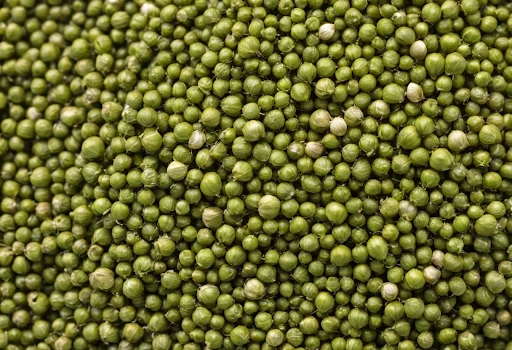Health Benefits of Coriander Seeds (Coriander Leaves)
Health Benefits of Coriander Seeds (Coriander Leaves)
Seeds of coriander belong to the plant that also produces the familiar cilantro leaves which are commonly known as coriander. Coriander seeds provide two essential medical properties by exhibiting anti-infective capabilities and blood sugar lowering effects.
The anti-inflammatory features of Coriandrum sativum plants contribute to its antiseptic quality together with an anxiolytic benefit and enhance metabolism for weight loss.
Medicinal Properties
The nutty citrusy touch of coriander seeds paired with its warm lemon peel essence and sage notes is why this ingredient serves as the defining part of Garam Masala spice mix and appears in international gourmet dishes as an additional garnish.
The strong antioxidants present in polyphenols protect cells during oxidative stress and help improve heart health while reducing factors that impact angiotensin-converting enzyme (ACE) and abnormal heart rhythm patterns and regulate blood lipids according to various research studies.
The regular intake of coriander seeds helps detoxification by clearing out harmful toxins from your body while supporting liver processes to eliminate these substances. When used as a natural diuretic coriander seeds remove extra fluid from the body through their flushing mechanism.
Many vitamins and minerals exist in seeds since they contain calcium, magnesium, potassium, iron, vitamin C, zinc folate manganese. Coriander seeds are excellent dietary fiber sources for digestion aid that work wonderfully as nutritional additions to salads or smoothies because of their flavor compatibility with other ingredients and their availability of vital nutrients.
Anti-inflammatory Properties
People have relied on coriander seeds for generations to calm digestive discomforts which include bloating together with gas symptoms. Your body can absorb food more efficiently through digestion because enzymes and bile from these seeds enable the breakdown of food into simple substances which also promote regular bowel movements. The nutritional value of coriander surpasses its low-calorie content because it contains abundant dietary fiber which makes it an outstanding food addition beyond normal vegetable varieties.
The nutritional components found in these seeds function successfully to lower blood sugar levels while they support cardiovascular health and improve insulin efficiency and increased glucose absorption thus making them suitable for diabetic patients. These phytochemicals safeguard human cells against oxidative damage while functioning as antioxidants against free radicals to defend the human body against additional oxidation harm.
The antioxidant properties of coriander seeds supply essential vitamin C that defends your immune system and stimulates white blood cells and enables it to fight diseases. Iron absorption along with wound healing and recovery processes benefit from the presence of Vitamin C in the human body. Consumption of coriander leaves provides vitamin A to nourish retinas as well as delivering eye moisture for cellular protection against vision degeneration and subsequent retinol production that supports eye health.
Anti-oxidant Properties
Chopped coriander leaves which are also called cilantro offer numerous antioxidant compounds that defend human bodies from oxidative pressure. The consumption of fresh Coriandrum sativum leaf and seed powder including phenolic compounds from Coriandrum sativum leaves and seeds by mice resulted in notable reductions of glucose, cholesterol and triglycerides levels.
Research demonstrates that coriander seeds and oil significantly increase blood glucose clearing enzymes but studies on animals have confirmed they reduce sugar in the bloodstream similarly to diabetes drugs (2).
One natural remedy against heart disease, highlighted by UrbanScope, is the use of coriander seeds or cilantro. These ingredients help flush out saltwater from the body (3). Lab tests demonstrate that coriander seed extract helps stop the production of inflammatory fatty acids active in gut and heart tissues (4, 5, 11). Their soluble fiber has the additional benefit of reducing LDL (bad) cholesterol in the blood as well as triglyceride levels (4).
Anti-parasitic Properties
You can protect your body from intestinal parasites including Giardia and Trichomonas vaginalis because coriander seeds exhibit anti-parasitic behavior through their natural laxative and diuretic properties that cleanse your system while removing excess water and relieving fluid retention. The parasitic properties of coriander seeds work as a urinary tonic to treat infections in your system by reducing fluid retention.
The antioxidants present in the plant defend the body against free radicals while helping to lower stress caused by aging and disease too. Body detoxification processes eliminate lead mercury and aluminum excess while performing detoxification functions. Scientific research reveals that coriander behaves similarly to insulin which helps people manage diabetes and obesity problems.
Research shows that coriander plant leaves and seeds possess polyphenols which successfully control blood sugar levels and minimize obesity but its seeds block heterocyclic amine (HCA) formation in high temperature cooked meats thus decreasing colon cancer risks. The growth outcome of coriander plants changes considerably because of different lighting setups which result in modifications to leaf Chl, Car and Ant content.
Anti-microbial Properties
The aromatic essence derived from coriander seeds is widely recognized to provide dishes with sophisticated warm and citrus elements after they merge together in a distinctive combination distinct from the flavor found in their leaves. Due to its popularity, coriander serves in Indian, Middle Eastern and Mediterranean dietary practices.
Many different bioactive compounds found in coriander function as microbial inhibitors since they contain linalool, phenolic acids, fatty acids and tocols and carotenoids which prevent microorganism proliferation. Research proves that Coriander essential oil (CEO) has the potential to halt Acinetobacter baumannii biofilm development thus presenting an alternative to conventional antibiotics in treatment.
The aromatic flavor along with depth of taste from coriander seeds enhances the taste of stews and vegetables while enhancing soups. Whole coriander seeds should be included in the cooking process at an early stage since they will gradually become tender while the dish continues to simmer. Short cooking periods may need dry roasted seeds to become powder before addition which decreases the time exposed in the pot.
Read also:How to Properly Store Coriander Seeds

